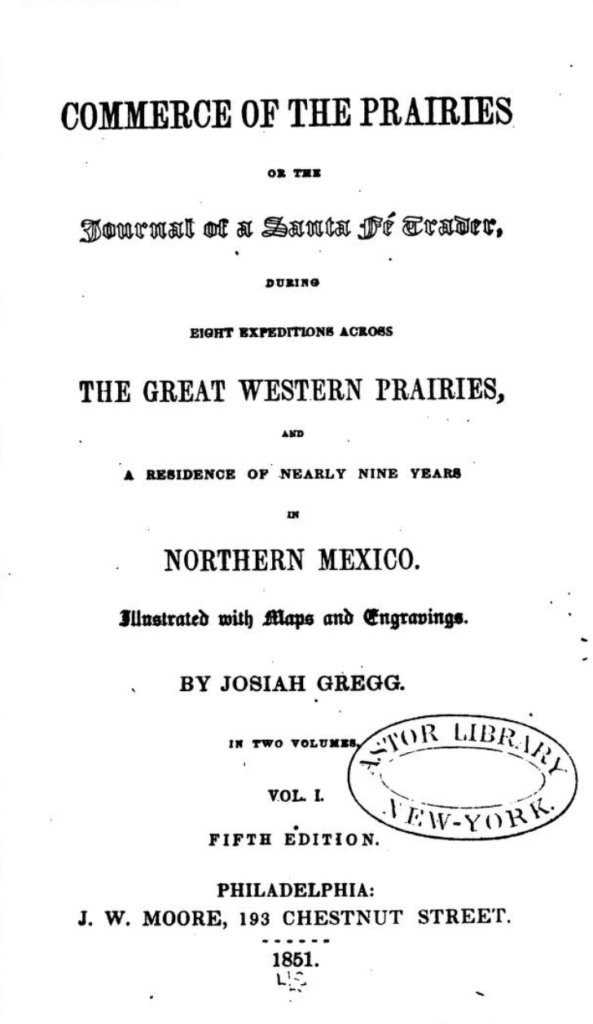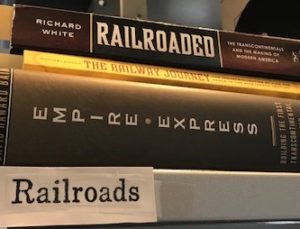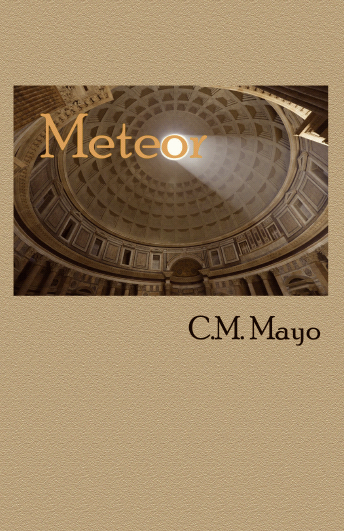
This blog posts on Mondays. This year, 2021, I am dedicating the first Monday of the month to Texas Books, in which I share with you some of the more unusual and interesting books in the Texas Bibliothek, that is, my working library. Listen in any time to the related podcast series.
Texas history aficionados, welcome and bienvenido! I invite you to check out these three fascinating—and free—digitalized rare books:

Gregg, Josiah. Commerce of the Prairies: Or the Journal of a Santa Fe Trader During Eight Expeditions Across the Great Western Prairies and a Residence of Nearly Nine Years in Northern Mexico. Two Vols, J.W. Moore, 1851. Fifth Edition.
A best-seller of its day. The editor was none other than John Bigelow, who later became the US ambassador to France during the US Civil War—the time of Mexico’s French Intervention / Second Empire. Gregg’s memoir is vital reading for anyone interested in the history of the West, the Southwest, and the history of US-Mexico trade.
Domenech, Abbé Emmanuel. Missionary Adventures in Texas and Mexico: A Personal Narrative of Six Years’ Sojourn in Those Regions. Longman, Brown, Green, Longmans, and Roberts, 1858.
A few years after its publication, Abbé Dommenech served as Maximilian’s press secretary. Here he recounts his travels in the parts that might more properly be called Apachería and Comanchería. Grim stuff.
Sherman, William T. The Memoirs of General William T. Sherman. D. Appleton and Co., 1886
One of the greatest memoirs of the 19th century. Some mighty strange stories in here.
If this finds you, dear writerly reader, working on a biography, history, or historical fiction, whether Texas-related or not, the rest of this post is also for you. Normally I post for my writing workshop the second Monday of each month, but on occasion I make an exception. (In any event, look for the regular workshop post next Monday.)
Hot Diggety Digital!
Is it practical to go all digital with your working library? Probably not. But partially, yes. It depends on your project and your daily capacity for screentime & scrollin’. As I continue with my book in-progress on Far West Texas which, of all my several books to-date, has required the largest working library, this finds me still a-huffin’ & a-puffin’ up the learning curve for utilizing and managing my working library. But I can say that I’ve achieved some oxygen-tank-worthy altitude! Three things about working with working libraries that I learned the “ouch” way:
(A) buy the book whenever possible (else I may not get my hands on it again);
(B) make space, more space than you will ever think you could possibly need for the working library because… you will need it; and
(C) in some way, ruthlessly, keep the books organized (for this I use categories and bookmarks. See A Working Library: Further Notes and Tips for Writers of Historical Fiction, Biography, History, Travel Memoir / Essay, etc.).
I cannot say it too often, a book I cannot find is a book I might as well not own.
A BOOK I CANNOT FIND
IS
A BOOK I MIGHT AS WELL NOT OWN
Kindles?
Only when I don’t have another option. For this particular book project, I have not found Kindles of much use. In my experience, for the most part, where there is a Kindle, there is also a paperback and I ever and always prefer the paperback.
What About Using (Um, Actually Going to) a Library or Three?
Yes, of course, I have used both public and research libraries. That would be another blog post (such as this one). That said, for independent scholars with limited travel options, relying on libraries is not ever and always nor even usually the best option when it comes to consulting a given book. Let me put it this way: I don’t cook spaghetti one noodle at a time, either.
Rare Books Out of Reach?
But what about when a needed book is impossible to find and/or too expensive to buy? A fine copy of certain classic 19th works can go for hundreds, even (I’m talking about you, Josiah Gregg) thousands of dollars. Happily, many such classics are now in the public domain, that is to say, they are out of copyright and some publisher somewhere has brought out an affordable paperback edition. My working library has many such paperbacks purchased for a few bucks each from my go-to online booksellers. I’ve also purchased used and ex-library books of later editions, many of which books, not being in such good shape, are generally inexpensive (sometimes the book is cheaper than the shipping), these mainly from www.abebooks.com. And finally, on a few special occasions, I have shelled out a pile of clams for a rare book (see my posts on rare books here and here, for example). For rare books, stay away from amazon and ebay because many used book sellers on those platforms do not know how to properly describe a rare book (you’ll think you’re getting the elephant, but what shows up is a three-legged alpaca). It is best to buy from a member-in-good-standing of the Antiquarian Booksellers Association of America, or similar association, for those dealers based in other countries.
Free!
Fortunately for this writer’s pocketbook, many out-of-copyright oldies are now available in ***free*** digital editions on the nonprofit Internet Archive archive.org and/or the Gutenberg Project gutenberg.org. Lo and behold, many of the books I need in my working library fall into this category.
For example, the English translation of the French Abbé Emmanuel Domenech’s memoir Missionary Adventures in Texas and Mexico was one I had been looking for several years (it was relevant to an earlier book of mine, as well.) When a copy finally popped up, alas, its price was well out of my budget. But I can now access Domenech’s memoir for my working purposes, thanks to the free online edition.
And Searchable!
Yep, digital books are also searchable and that can come in handy.
Behold:
The Digital Döppelgänger
So, after some time working on this Far West Texas book, I have accumulated what I think of as the digital Doppelgänger to my physical working library, the Texas Bibliothek.
As I noted in a previous post about how I organize my (physical) working library, I shelve the physical books under categories that work for me— categories that may not necessarily make sense to anyone else. I also include books which inclusion may not make sense to anyone else. And that is OK: Anyone Else is not the name of the person writing my book. Nor is Anyone Else writing your book, I would imagine…
And what about when, as is oftentimes the case, a book falls into two or more categories? Well, la de diddly da, I just pick one category, and go with that. My working library may be large, but I don’t need to put on rollerskates to go in there.
How to keep an online working library
organized for one’s writerly purposes?
For the online library originally I kept a list, by author in alphabetical order, on a blogger blog (treating it as basically a free, oft-updated webpage). But I have since moved to a system that works much better for me: I categorize the links to the online books in the same way as I do my physical working library, using a photo for quick reference, on a private page of my very own self-hosted WordPress blog, Madam Mayo.
Herewith, one example of the approximately 30 categories in my online working library (that is to say, a photo of the physical working library ‘s label and shelf + any online titles):

Davis, Richard Harding. The West from a Car-Window, Harper & Brothers, 1892.
*

Q & A with Sergio Troncoso, Author of A Peculiar Kind of Immigrant’s Son
A Review of Claudio Saunt’s West of the Revolution:
An Uncommon History of 1776
*
My new book is Meteor

